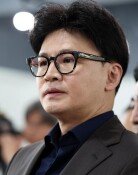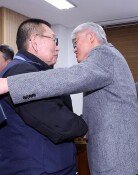[Opinion] NHK Fraud Scandal
[Opinion] NHK Fraud Scandal
Posted September. 15, 2004 22:01,
Nippon Hoso Kyokai (NHK), the Japanese government-run broadcasting station, now faces big trouble due to a series of fraud cases by its employees. NHK Chairman Katsuji Ebisawa, famous for his pride in his station during his six-year-long tenure in power, appeared before the hearing of the Diet and apologized. The national broadcasting station also aired a one-hour special program about the embezzlement and expressed its deep apology. However, its old habit did not go away. The station often used to broadcast from the Diet, but this time it failed to do it when its chairman appeared before the hearing. As the TV audience became angered, it first kept making excuses, saying it is the matter of the stations right of programming. Then, it aired it belatedly. However, the three-hour hearing was shortened to 40 minutes, and even the moment when Diet members raised sharp questions and called for his resignation was not aired.
Among involved employees, the former head of the Seoul branch office is included. He even received the nickname, Hannam-dong Emperor, because of his extravagance in the bars of the Hannam area, Youngsan-gu. MHK is a behemoth company with 17,000 employees and a 730 billion yen budget. NHK viewers have long been displeased with the extravagance of NHK employees, and the station has always required its viewers to pay more.
NHK often used to compare itself with the British Broadcasting Corporation (BBC). NHKs documentary series, The Silk Road, fairly deserves a complement, but the station is often viewed as pro-bureaucrat. When the scandal of British governments extortion on information regarding nuclear weapons broke out, BBC made a program based on its thorough investigation and tracked it down. On the other hand, NHK uncritically supported the government when it decided to deploy the Self-defense Forces in Iraq against public opinion.
The Korean Broadcasting System (KBS) was first formed during the Jeon Du-hwan regime, which took power through two military coups on December 12, 1979 and May 17, 1980. It required its viewers to pay, saying KBS Channel 1 aired no commercials. However, it again collected advertising revenues from companies airing their ads on KBS Channel 2. Munhwa Broadcasting Corporation (MBC) airs commercial advertisements, but it is registered as a state-run broadcasting station. Democratization has removed the relics of military dictatorship in most of Korean society. But still, the irregularity in Koreas broadcasting system is a sanctuary. Using political power in an attempt to influence broadcasting and people under the name of broadcasting for the people seems to exist anywhere.
Jo Heon-ju, Tokyo correspondent, hanscho@donga.com







